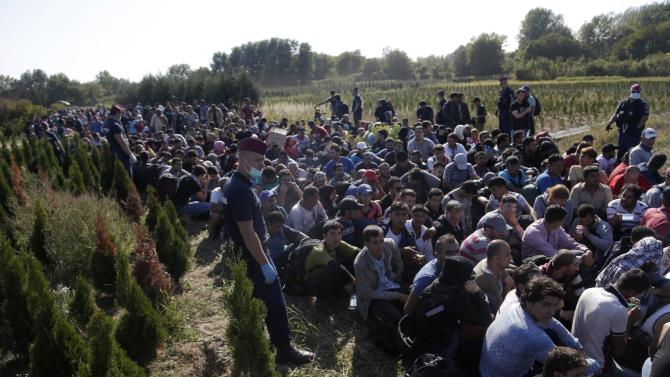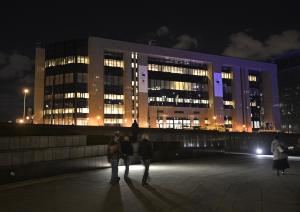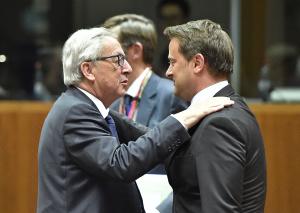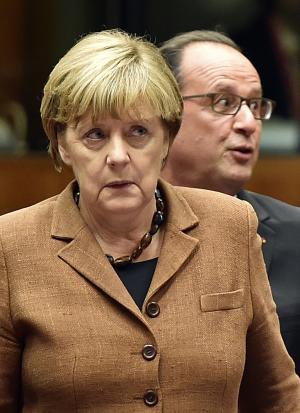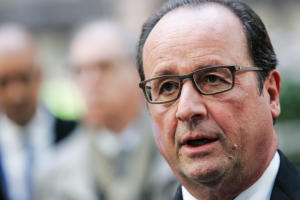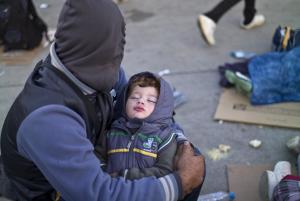Date: Thu, 24 Sep 2015 14:31:48 +0200
September 24, 2015
BRUSSELS (AP) — The latest developments as European governments struggle to cope with the huge number of people moving across Europe. All times local:
12:20 p.m.
Norway's domestic intelligence agency says the influx of migrants has a consequence for the general threat assessment in the country, mainly in the potential for a backlash.
More than 2,800 people, mainly Syrians, have sought shelter in Norway so far in Norway in September.
Siv Alsen of the PST security police says there is a potential that left-wing groups rallying to support refugee-related cases and "can lead to counter-reactions and violent clashes" with right-wing extremists.
In Thursday's statement, Alsen said asylum-seekers linked to radical Islamism are "not a central concern" in the short term, adding the main threat comes primarily from people born or raised in Norway.
The country expects to receive up to 20,000 asylum-seekers this year, compared to 11,480 people in 2014.
___
12:05 p.m.
French officials say a teenage migrant from east Africa was struck and killed by a freight train as he tried to make the dangerous crossing from northern France to Britain through the Channel Tunnel.
The Calais prefecture's office said the man's body was discovered around 2 a.m. Thursday by rescue workers near the tracks. Eurotunnel, which operates the freight service, also confirmed the death in the French terminal area.
About a dozen migrants have died since this summer in Calais, where they are camped in hopes of reaching a better life in Britain. Britain and France have reinforced security at the entrance of the Tunnel linking the two countries after a series of attempts to rush the site en masse.
___
11:10 a.m.
More than 10,000 refugees and other migrants have entered Hungary in a single day, the highest figure this year, as Prime Minister Viktor Orban said he was willing to consider letting people through to Western Europe.
Police said Thursday that 10,046 people arrived in Hungary the day before, surpassing the previous mark of 9,380 set Sept. 14, just before Hungary closed down its border with Serbia.
While nearly all the migrants are now taking a detour and entering from Croatia, Hungary is also building a fence on that border which Orban said would be ready by the weekend.
Early Thursday, however, after a meeting of EU national leaders in Brussels, Orban said Hungary would consider giving the migrants free passage toward Austria and Germany, where many want to go.
Orban cited Austrian Chancellor Werner Faymann, who "clearly said that if we can only stop them with the fence, then we should rather let them through. This is what must be considered."
___
9:05 a.m.
The governors of Germany's 16 states are in Berlin to meet with Chancellor Angela Merkel for talks on how to manage the influx of migrants to the country.
Over the past year Germany has received hundreds of thousands of Syrians, Iraqis and others fleeing war and poverty.
But the huge number of people needing food and shelter has strained even the resources of Europe's biggest economy.
The meeting Thursday in Berlin is aimed at improving cooperation between national and local authorities, and speeding up the bureaucratic process of asylum claims.
___
8:55 a.m.
Serbia has banned imports of Croatian goods and Croatia has retaliated by barring vehicles with Serbian license plates from entering the country as relations between the two Balkan neighbors deteriorated over the influx of migrants over their border.
Serbia had given Croatia an ultimatum to reopen its border for all cargo transport by midnight, which Croatia has been blocking since last week.
Croatia's police said Serbian nationals were not let into Croatia early Thursday because of "a problem" with the border information site.
Croatia shut all but one of its crossings with Serbia to block the migrant surge, which reached nearly 45,000 in a week. Croatia is angry that Serbia is busing migrants to its border, rather than sending them north to Hungary.
Croatia's action has crippled the economy in Serbia, a conduit for cargo across Croatia to western and central Europe.
___
8:40 a.m.
Romania's president says his country will give 300,000 euros ($336,000) in the next three years to the World Food Program to help relief agencies offer food and shelter to people fleeing conflicts.
President Klaus Iohannis spoke early Thursday after an emergency European Union summit to discuss ways of tackling the migration crisis. At the meeting leaders agreed to give an extra 1 billion euros ($1.1 billion) to the United Nations refugee agency and World Food program to help refugees.
